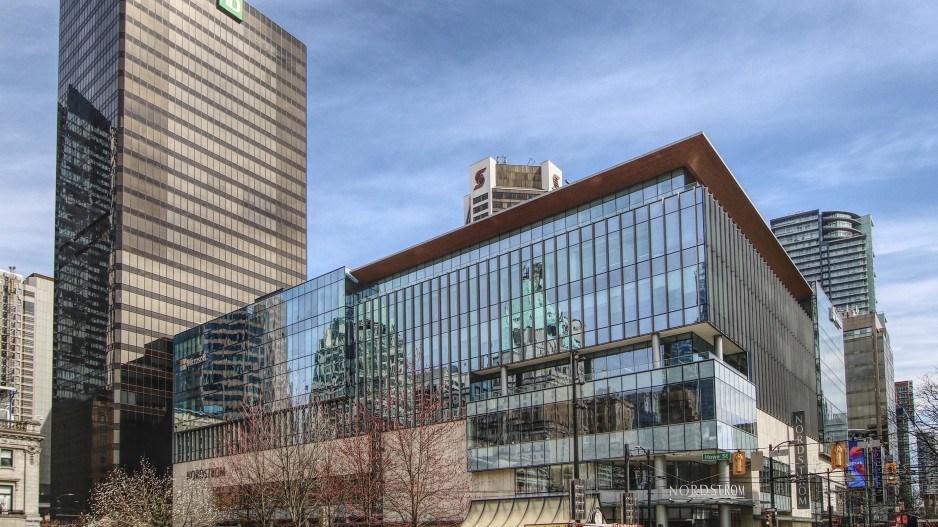Higher retail and office vacancy rates helped keep foot traffic below pre-pandemic levels in much of downtown Vancouver last year, according to the Downtown Vancouver Business Improvement Association (DVBIA).
It released its State of Downtown 2023 report this morning to give a snapshot on the state of business activity in the approximately 90 blocks of real estate that it oversees.
The DVBIA tracks visitor volume on its four retail corridors: Alberni Street's luxury-retail corridor; the Granville Entertainment District, Robson Street and West Hastings Street.
"Since November 2021, 22 retail stores have opened and 33 have closed leading to a net loss of eleven," the DVBIA's report reads. "Most notably, Nordstrom (Inc. [NYSE:JWN]) announced on March 2 that the company will close all Canadian locations due to poor sales across sa国际传媒."
That stores's closure is set to leave 230,000 square feet of space vacant at the heart of the downtown core.
Some good news is that Cadillac Fairview's senior vice-president for Canadian retail, .
"We've had significant interest from multiple parties considering leasing all of the space, and a portion of the space," he said.
"We're confident that we'll be able to put together a retail offering that the general public will once again be excited about."
Knoepfel said he expects the space to remain a retail hub, although some non-retailers have contacted him.
He is considering redeveloping the space to accommodate "three to five" retailers, he said.
Getting new tenants in the space will be key to driving a recovery in downtown foot traffic.
The pandemic led to a 71-per-cent drop in monthly visits to the downtown, according to the DVBIA's report.
In 2022, visits to downtown recovered significantly compared with the previous two years, but they remain down about 14.5 per cent compared with 2019, the DVBIA said.
In 2021, foot traffic downtown was down 36.2 per cent compared with 2019, according to the DVBIA.
Retail and office vacancy likely contributed to less foot traffic in the area.
As of February 2023, downtown storefront vacancy was 13 per cent – up from 12.8 per cent one year earlier, according to the DVBIA.
Other data crunchers are seeing a similar slow recovery in office occupancy.
Avison Young on Monday reported that – to 10.8 per cent.
This comes on the heels of CBRE data for the fourth quarter of 2022, in which it said total due to an uptick in large and full-floor spaces given back by major tenants downtown.
SAP SE (NYSE:SAP), Kabam and Microsoft Corp. (Nasdaq:MSFT) are some of the companies subleasing space.
Job cuts at Amazon.com Inc. (Nasdaq:AMZN) have led to speculation that it may not fully occupy the 1,050,000 square feet that it is pre-leasing at the soon to be complete two-tower Post building in the city block bounded by West Georgia, Hamilton, Dunsmuir and Homer streets.
The DVBIA noted that one bright spot was that food and beverage businesses have recovered better than other downtown storefront businesses.
Restaurants were the first businesses to be required to limit operations, when indoor dining was banned in mid-March 2020.
"As pandemic restrictions ended, they were also the first businesses to return," the DVBIA's report notes. "Since November 2021, 34 food and beverage establishments have opened downtown and 22 have closed, leading to a net gain of 12 businesses. Quick-service dining restaurants, defined as restaurants where customers order at a counter, saw the most openings."
The DVBIA also that downtown Vancouver hotel occupancy increased in 2022 to be 72 per cent, compared with 40 per cent last year. Current occupancy is about 10 per cent less than it was in 2019.



